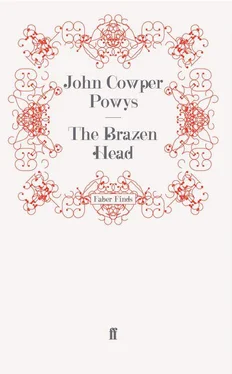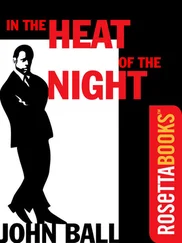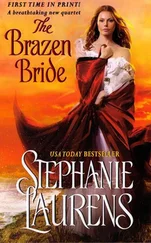And the psychic trick Albertus used on this occasion was the wisest possible one he could have used, namely the trick of appropriating to himself and to his own feelings at such moments the bold and perhaps scandalous assumption that the Son of God was humorously aware of the sublime stupidity of the race of mortals, whose flesh he had submissively adopted for some unknown and secret purpose of his Divine Parent.
Raymond de Laon however had not bowed the knee at the reference to the Paraclete, nor had he stiffened himself in preparation for entering the Fortress. His face had indeed taken on a look of infinite relief. He had in fact been terribly afraid that Albert would at this juncture try to do what so many of the so-called Averroists did — namely, slur over the Athenian thinker’s conviction as to the eternity of “Matter” or “Hulee”, and insert into this unconscionable substance a nebulous and vaporous wedge of divine providence.
To Raymond it was a turning point in his whole mental life, this frank and free admission, by Albertus of Cologne, that, if a student honestly followed Aristotle, he couldn’t, with any integrity of mind or any consent of reason, refuse to accept the Aristotelian conclusion as to the eternity of the world.
It was therefore with the abysmal craving of his deepest nature that Raymond now awaited from Albert some notion of what he actually meant by the word Revelation.
“What we must do as Christians,” Albert of Cologne announced slowly, “is just to accept by a pure and simple act of faith the Revelation of Jesus that He was, and is, the Son of God, and that God in the beginning created the world. There are therefore,” Albert went on quietly, “two accounts of the origin of all things: first the view offered us by the greatest of all human thinkers that the world never had a beginning, but has always existed, and secondly the revelation of Jesus that He and He only is the true Son of God, and that in the beginning God created the world.
“The first of these opinions is the one we hold when we follow our human reason. The second is the one we hold when we accept the view that Jesus is the Son of God, and what He tells us about the universe is the truth. Which of these two views about the beginning of things we as individuals accept will therefore depend upon how far we are ready to follow Faith, when it goes beyond Reason and even when it flatly contradicts the view derived from Reason.
“If Matter is eternal, why then the world we live in is likewise eternal, for it is made of Matter or what the Greeks called “hulee”; and, if our world is eternal, it has not been created by anyone. When Jesus talked of ‘His Father in Heaven’, it is quite clear that he spoke as a Jew, and that he was thinking of the God of the Jews. By the Divinity within Him on the strength of which He spoke, He was Himself convinced that He was the Son of God, and it was in the Power of this conviction that He enlarged his Father’s Godhead till it went far beyond the Jewish race. The God of the Jews, though nameless, we call Jehovah; but the God whom Jesus called Father was the God of the whole world, who existed before he created all that is, and who will go on existing when all that is has ceased to exist.”
Raymond de Laon had missed no syllable of this pronouncement; nor had he failed to notice how easily, naturally, and unofficially this tremendous Credo had been declared.
“Will Lady Val,” he thought, “let me take Lil-Umbra for a short ride after their visitor has been properly welcomed and has gone to the armoury to rest? Will they find the old bailiff still there? Or will they have moved him elsewhere so that this man can sleep alone, as he clearly wants to do, with that awful Brazen Head? God in Heaven! I wouldn’t sleep with that Thing in the room, though by so doing I were to be crowned King of Poland! What if the Thing Inside came out and stood by the head of my bed? I verily believe I’d go crazy with terror! O I do so long to talk to Lil-Umbra about all these things. She’s got all young John’s cleverness and all Tilton’s soundness and good sense.”
“Well, my Lord Albertus, shall we move on again? It’s not more than a mile from here.”
“I’m at your service, my son; and I warrant that you, my lads”—and he gave the Cone Castle group a friendly smile—“will be thankful enough to exchange our theology for a beaker of good ale or even a flagon of cider!”
The silence of them all was very marked as they threaded their way between mossy fir-stumps and ferny rocks, while the hot noon-rays, hidden by one branch and revealed between two branches, and forever being broken and intercepted by the dark feathery foliage of ancestral pines, turned the endless bluebells, upon which it seemed impossible to avoid treading, into an elfin army of some aboriginal pixy-monarch, who though confronted by a cohort of giants was by no means frustrated in his attempt to add yet another outpost to his sylvan realm. It was indeed a natural part, this speechless silence of them all, of the sweltering docility of every forest creature under the royal glare of the lord of life.
When they came in sight of the Great Gate of the Fortress a curious psychic event occurred. This was an event that, in itself without any further evidence, is a proof that all those wild and desperate feelings which reach us from every quarter of the horizon, passing from the north to the west, and from the west, through the north again, to the south, are sometimes fully justified.
For here, precisely and exactly here, where, by a superhuman and Herculean heave, such as more than the muscles of any ordinary human frame could have endured without cracking or breaking, the Lord of the Manor of Roque lifted the horse Cheiron from his four hooves and rolled him over on the ground, the appalling strain of the effort he made, and the weird desperation of the awareness accompanying it, had actually created a living spirit.
And at this point in their approach to this spot every single one of this small company, including Raymond and Albert the Great, felt a definite stab in the region of their heart, as if an invisible spirit had struck them just there.
And if Albert of Cologne had boldly enquired: “To what tribe of spirits do you belong?” this “Genius Loci” might well have answered with the words: “I am the spirit of a supernatural effort, an effort that was not only an effort of muscles but an effort of will and an effort of mind and an effort that drew into itself a positively unlawful, insupportable, and intolerable strength from all the living things about it, from the trees, from the creatures of the earth, from the birds of the air, from the actual stones and rocks and earth-mould of this place, so that”, thus might the spirit of that shock, the spirit of that superhuman strain have replied to the bold question of the sage from Cologne, “so that I am a spirit which to the end of time, yes! until ice from above, or fire from below, destroy this whole forest, will embody in a shudder of this air the effort this man made; one of the most terrific efforts ever made on this earth since Hercules lifted up the Giant Antaeus in his arms to strangle him in the air; and I, the spirit of this appalling effort, will remain here to guard this man’s gate against all his enemies unto the third and fourth millennium of his descendants!”
It was about this man, the Lord of the Manor of Roque and the master of the Fortress, that Albertus Magnus enquired at once, the moment he was ushered by Raymond de Laon in to the presence of Lady Val.
“Yes, O yes!” the lady replied, “and I’ll certainly tell him that your first question, reverend sir, was about his health. He strained something inside him. Gorthruk, our manor leech, who came here five years ago straight from Oxford, and is said to have studied medicine under the court physician in Paris, is of opinion that though the injury itself can never, by the nature of it, heal itself, my husband will very shortly be well enough to resume his hunting and fishing and his usual protective investigations round the outskirts of the Manor.
Читать дальше











